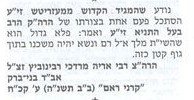
Here's a snippet from yesterday's Hebrew HaModia in honor of 24 Teves.
"It became known that the holy Maggid of Mezritch once looked at the face of the Holy Rav the Baal HaTanya and said: What a great wonder it is that G-d, so lofty and awesome, has decided to reside in so miniscule a body!
Do the good people of HaModia know what they put in here?

Hmmm, maybe there's a mole at Homodea...
ReplyDeletevery suspcicious.
all i will say is that this is a far shot from what the Elokistim are saying
ReplyDeleteeli
ReplyDeleteelaborate please
Of course it's a far shot, but they take words like that and fardrey them.
all this is saying that the BH made a dirah for hashem and hashem moved in not that the BH had all the attrubits of hashem
ReplyDeletehtere much sharfer verter out there that compare tzdikim to hashem
eli
ReplyDeletewe know that, but the question is, not so much for you, but for others, what did the Rebbe say that was worse than that, and that aroused the ire of the G'deylim?
Friends, it's well known to anybody that ever saw the Sefer Al HaTzadikim from RAB Pevzner that much more "radical" things have been said. The point here is that for some reason, the Rebbe, who only quoted the Zohar HaKodosh, gets "flack" for somehow "causing these unlearned boors to confuse the facts and make crazy and heretical assumptions.
ReplyDeleteI think this story never happened.
ReplyDeleteI think it's a corroption of this story:: The Bardichiver or someone else saw sefer hatanya said "What a great wonder it is that G-d, so lofty and awesome, has decided to reside in so small a safer"
correction
ReplyDelete"hot er arein geleigt in aza kleyner sefer"
oich
ReplyDeleteI know that story, but what makes you think they'd change the story to this? that usually does not happen. If anything it was changed from the guf to the sefer.
see סיפורים וגלגוליהם from rabbi mundstein on shturem
ReplyDeleteeli
ReplyDeleteabout stories in general or this one in particular?
in general
ReplyDeletecome on tziggaleh! you never heard the vort that "deh mayseh hut a langeh vayseh bord"
ReplyDelete& lav davke That they did it on b'kavonoh, it just so happens with mayses bal peh, that are given over m'dor l'dor
oich
ReplyDeletelange mayses with a poritz and a "moshke" etc., they do, but a pisgom kotzor from the maggid? dos nisht.
sorry billy goat, but your wrong. ask a group of yunge leit or bocherim leaving a farbrengen with R M Futerfas & the like, to repeat a mayseh ah vort etc. & you'll hear 10 versions. The good thing about these days is that everything gets recorded.
ReplyDeleteI know all about it, oich. I just mean to say that verter like this usually are not made up.
ReplyDeletei didn't say they are made up. All i said was that it might be a corroption of a very similar story.
ReplyDeleteWhen I challenged some unsourced 'maysaleh' I got so much flack.................
ReplyDeletevml, I think the difference between us is quite noticable. You challenge everything, & you do it with a "mshugah l'oysoy dovor" zeal, I don't.
ReplyDeleteVML
ReplyDeleteeven the Satmar Rov z"l, who challenged all stories even when told by the einiklach in front of him, believed the mayses about his zaydes. I hope you believe SOME stories, az nisht.......
I heard the story that the Berdichever said when he first saw the tanya Kadisha - azeyfil Yiras Shomayim in a za kleinem sefer !
ReplyDeleteNow I see others have already noted this.
I think the Bais rebbe even brings this version.
Kurenitzer has returned!
ReplyDeletewe missed you.
good to have you back.
where can I read VML challenges? they semm more interesting than this debate?
ReplyDeleteobviously anything can be twisted by elokistim, just as hamodia and their like are notorious for finding the most distant gilgul of a vertel or maase so it is most likely that it is the story about the barditchover in a different version.
(the nusach I heard or saw was "vi hut er araingeleigt aza greisn eibershter in aza kleinem seifer" just as qouted before if my 2 cents matter)
There are at least two occasions on which Reish Laqish is quoted in B'reshis Rabbah as saying that ha-avot hen hen ha-merkava (i.e. the patriarchs are the chariot of HaShem). Perhaps it was related to that?
ReplyDeleteWho knows how far back this stuff stretches! Sometimes I get the feeling that even the Monotheism of Judaism is shaky compared with, say, ISLAM!